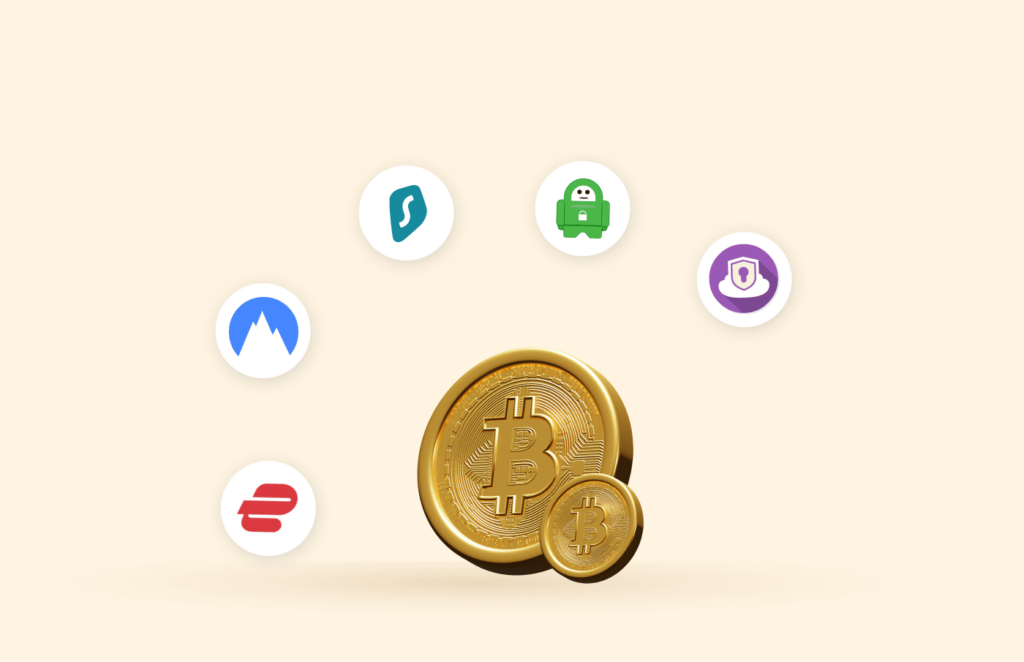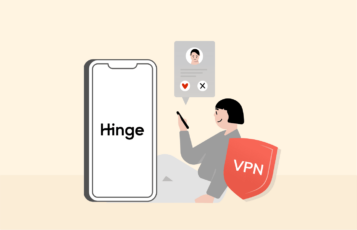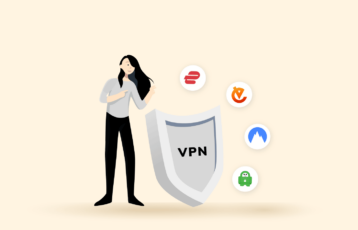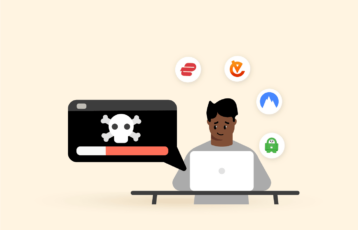Cryptocurrency trading involves speculating price movements or buying and selling Bitcoins and other altcoins through an exchange. With CFD trading, you can go short (sell) or long (buy) without owning the underlying coins. However, you must make a small deposit (margin) to gain full access to the underlying market.
The downside is that cryptocurrency wallets, trading platforms, and exchanges are susceptible to hacking.
However, a VPN that accepts Bitcoin and other cryptocurrencies gives you the security and anonymity you need to stay protected from prying eyes. This guide will examine the best VPNs for cryptocurrency trading, why you need one for crypto activities and more.
Top crypto VPNs quick list
Short on time? Do not worry. We understand sometimes a user might want to pay for a VPN with Bitcoin quickly as it provides the maximum possible anonymity at the purchase time. Below, you can have a quick look at our 3 best VPNs that accept crypto as payment and help keep your activities safe:
- NordVPN – Our #1 recommended VPN with unrestricted simultaneous connections, low-cost plans.
- Private Internet Access (PIA) – Among the reliable VPNs. Has thousands of servers are present in 84 countries and have a refund policy of 30 days.
- ExpressVPN – Top-notch VPN for cryptocurrency. Boasts super-fast speeds, unlimited bandwidth, TrustedServer technology, 30-day-money-back guarantee.
Do you wish to compare the best crypto VPNs more thoroughly? No problem again (excellent thought, we’d say). Keep reading.
Quick guide on how to use a VPN service for crypto transactions
- Pick a VPN that accepts cryptocurrency for payments. NordVPN is our number one recommendation (you probably read above why already).
- Complete your VPN purchase, download it, and then install it.
- Connect to a server.
- Open your Crypto wallet and perform your transactions with stealthy security and better privacy.
Why you should use a VPN for crypto activities
Bitcoin is a digital currency that is entirely virtual. It works using blockchain technology that involves a large number of nodes. This makes it difficult to fake bitcoins, and a malicious actor has to hack all the nodes simultaneously to succeed.
The blockchain system is protected with strong cryptography, but cryptocurrency transactions are not entirely safe and anonymous. In addition, they are irreversible, which means a coin can disappear from your account without a trace. Besides, there are increasing reports of hackers stealing small Bitcoin amounts from exchanges. For instance, in early 2107, Bithumb was hacked, and over $1,000,000 was stolen.
Security risks that come with cryptocurrency
Besides online exchange hacking, cryptocurrency faces many other issues. Here are the most common:
Offline wallets
They are cumbersome and vulnerable to hacking. For example, Masad Stealer, remote control spyware, targets offline crypto wallets on mobile devices and computers.
Initial Coin Offering (ICO)
These days, numerous crypto startups are offering ICOs. While most are legitimate, some are fake, so you should be careful.
Fake crypto exchanges
Crypto exchanges allow you to buy or sell Bitcoin and other digital currencies. Ensure that you use a reputable exchange to be on the safer side.
Unsecure addresses
Bitcoin addresses are not completely anonymous, so you can be compromised. Therefore, avoid posting your address on social media or sharing it on messaging apps. It can easily reveal your identity.
Remember that cryptocurrency addresses are publicly recorded for transparency. Hackers can target your cryptocurrency wallet, especially if you have a lot of money.
Phishing attacks
Phishing is a social engineering attack where malicious actors trick you into giving your personal information. The hacker masquerades as a trusted entity, distinguishing phishing from other cyber-attacks. This technique was used to steal over 250 bitcoins from Electrum wallet around 2018.
Cryptojacking
This is an emerging online threat where cybercriminals hijack computers and mobile devices. They then use the device’s CPU as the Bitcoin mining load. Since it is an intensive activity, it can cause your system to slow down or shut off completely. So, always run a malware check if you notice an abrupt drop in system performance.
How a VPN helps protect crypto activities
Some of the above issues are the reasons why you should use a VPN when conducting your cryptocurrency transactions. A reliable VPN will:
Secure your crypto traffic
Connecting to a VPN will encrypt the data leaving your device before reaching its destination. Encryption is a technique that scrambles your internet traffic and makes it difficult to decipher. Even if a hacker successfully intercepts the traffic, the data is unreadable.
Why does this matter? You will usually use private or public WiFi to do your cryptocurrency transactions. Usually, these networks use WPA2 for security, which is insufficient and has serious vulnerabilities. Furthermore, many public hotspots do not have encryption. As a result, hackers can intercept your traffic, steal your wallet’s private keys, exchange credentials, and take over your account. Nonetheless, a good VPN will ensure you are always safe.
Unlocks trading platforms
Some trading platforms are geo-restricted, and you might be unable to access them depending on your location. For example, one of the largest crypto exchange platforms, Binance, is unavailable in the US. Similarly, the Chinese government has banned domestic and foreign crypto exchanges.
A VPN allows you to bypass geo-restrictions and censorship to unblock trading platforms from anywhere. All you have to do is connect to a server in a country where the trading platform is available. This will make you appear like you are within the supported country. Moreover, you can switch your virtual location to trade region-specific cryptocurrencies.
Prevents IP tracking
Unlike popular belief, cryptocurrencies are not entirely anonymous. They offer a certain level of privacy but not 100% anonymity.
Because all transactions are in the public domain, you can link your Bitcoin address to your IP address. This means malicious actors can easily trace your real identity and location. However, with a VPN, your traffic will seem to originate from the provider’s servers instead of your device.
Note: Many providers allow you to encrypt cryptocurrency activities and leave everything else on the regular traffic. Make sure you choose a VPN that follows a strict zero-logs policy. This is because hackers can match the logged information with your traffic.
Best VPNs for cryptocurrency
Let’s have a detailed look at the high-quality VPNs that accept Bitcoin. These providers are also ideal for safe cryptocurrency transactions. Our results are based on several factors: speed, server network, security, and privacy.
1. NordVPN

Our #1 recommended VPN for trading cryptocurrencies. It not only accepts crypto payments, but also supports crypto trading via stealth features.
Pros
- Massive server network
- Unblocks crypto trading sites
- Advanced security
Cons
- Lacks kill switch on Android
NordVPN is a well-established VPN that accepts cryptocurrencies and allows users to have safe crypto transactions. It has everything you will need in a VPN for crypto trading, including robust security measures, incredible speeds, and the ability to bypass geo-blocks.
It has massive worldwide coverage of more than 6,800 servers in 113 locations. There are multiple servers in every location, with the majority in the US. The SmartPlay feature will enable you to get around geo-restrictions, and access blocked crypto trading platforms from anywhere.
In terms of security, encryption technology is the first thing you must look out for. NordVPN uses military-grade AES 256-bit encryption and backs it with perfect forward secrecy. Other tricks it employs to maintain security include double VPN, OpenVPN protocol, automatic kill switch, RAM-only servers, and CyberSec malware blocker.
You might think you are safe with some VPNs, but the provider keeps personal information or browsing activity. NordVPN has a strict no-logs policy, and PwC has independently audited the claims. It is also registered in Panama, which is not a member of any massive spy network or alliance.
Another impressive privacy feature is the obfuscated servers, designed for regions with VPN restrictions like the UAE and Turkey. They will mask your traffic, location, and VPN activities. This will help you to avoid government censorship and conduct your crypto transactions privately.
It has a ticketing system and round-the-clock live chat if you need assistance. The customer representatives are knowledgeable and will handle any issues you may have. There is also a decent array of helpful information in the support section.
2. Private Internet Access (PIA)

Another great VPN with top-notch security, makes your crypto trades extremely safe.
Pros
- Variety of customization
- Fast servers
- Generous devices
Cons
- It does not work in China
Private Internet Access (PIA) is among the reliable VPNs to buy Bitcoin safely. It offers valuable features and ensures privacy, attracting a huge customer base worldwide.
The VPN provides various payment options, including popular credit cards and online payment platforms. It also accepts anonymous payments through Bitcoin and other cryptocurrencies.
A massive and spread-out server network is always better. This will enable you to evade bans, unblock crypto trading platforms in more locations, and get improved speeds. At present, it has thousands of servers in 91 countries.
Many VPNs claim to have military-grade encryption, but only a few do. Thankfully, PIA uses AES 128-bit encryption, but you can always switch to AES 256 encryption. Additional security features include OpenVPN protocol, automatic kill switch, and DNS leak protection.
The split tunnelling feature is available on desktop apps. It gives you more freedom as it lets you choose the traffic to encrypt. For example, you can protect your cryptocurrency transaction traffic and leave the rest outside the encrypted tunnel.
Does private internet access keep logs? One thing that will impress you with PIA is that it does not keep logs. The provider will not have any data in the first place, even if the government requests it. This means your cryptocurrency trading activities will always remain private.
Crypto exchanges are susceptible to malware attacks. PIA’s MACE feature will block intrusive pop-ups and prevent trackers and all malware types.
The VPN provides native Android, Windows, macOS, Linux, and iOS apps. All the apps have similar features except for the iOS app, which uses the IPsec protocol and lacks MACE features. It also offers Chrome, Opera, and Firefox secure browser extensions. Fortunately, it allows you to connect unlimited devices simultaneously.
3. ExpressVPN

Best choice for trading cryptocurrencies without any risk. It also respects crypto users’ privacy and accepts payments in cryptocurrency.
Pros
- Super-fast servers
- Reliable chat
- Accepts Bitcoin payments
Cons
- Priced a little higher than competitors
ExpressVPN is the best cryptocurrency trading VPN. It uses the latest security and privacy measures to protect your crypto transactions.
Firstly, it accepts multiple payment methods, including Bitcoin, promoting anonymous subscriptions.
Then, its network of 3000+ servers in 107 countries includes repressive regions like Turkey. So, you can access geo-restricted altcoins and trading platforms in many locations.
Notably, it boasts TrustedServer technology, also known as RAM-only servers. Since the servers can’t store data, all information wipes off automatically after every session. Hence, you become less vulnerable to cyberattacks when trading cryptocurrencies.
We did our speed tests of multiple VPNs for several days using both Ethernet and wireless connections. Results show that ExpressVPN is a speed wizard, especially with nearby servers.
ExpressVPN protects cryptocurrency transactions with AES 256-bit encryption, perfect forward secrecy, SHA-512 HMAC authentication, and an RSA key.
According to its privacy policy, the provider keeps no identifying information. It only gathers maintenance-related data such as app versions installed, data transfer, and connection date (not time). The VPN is registered in the British Virgin Islands, not in an alliance of sharing surveillance information. So you can conduct your cryptocurrency transactions privately.
The minimalist interface and easy-to-navigate server list make ExpressVPN an excellent choice for beginners. Setting up the app is effortless, whether on desktop or mobile. It works well with all the major operating systems, such as Windows, Android, macOS, iOS, and Linux. You can trade cryptocurrencies on your smartphone, tablet, PC, laptop, or other compatible devices.
ExpressVPN is slightly pricier than its rivals, but it’s worth considering its features. The annual package has the best value of $6.67 per month plus 3 months free. Nonetheless, the VPN backs its plans with a 30-day money-back guarantee.
4. Surfshark

A low-budget VPN that allows you to trade crypto safely. It’s no-logs policy and server obfuscation also keep your crypto activities anonymous.
Pros
- Accepts cryptocurrency payments
- 24/7 customer support
- Excellent speeds
Cons
- Prompt captchas when using a mobile app
Surfshark is another best VPN to buy Bitcoin safely. Besides being budget-friendly, it boasts various advanced features and works with all major operating systems.
Notably, its primary payment method includes cryptocurrencies, letting you buy your desired package anonymously, alongside credit cards, PayPal, Google Pay, Amazon Pay, and AliPay.
Surfshark operates a decent-sized network with consistent connections. It has 3,200+ servers in 100 locations and a significant presence in the US and Europe. Connect to a closer server to trade Bitcoins online for sufficient speed.
The VPN also provides industry-standard security features to protect your crypto trades. These include AES 256-bit encryption, 2048-bit DHE-RSA keys, and SHA512 authentication.
Besides, OpenVPN and IKEv2 are the default protocols on desktop and mobile apps, respectively. Shadowsocks encryption is also available as an alternative for Android and Windows users. Plus, WireGuard is the new addition to Surfshark’s protocol list. It is incredibly lightweight and open-source with incredible speeds.
The apps have plenty of features you will not find on other VPNs. First, the auto-connect feature will establish a connection when your device connects to the internet. Second, the ChaCha encryption performs better on Android devices. Third, its NoBorders feature will enable you to use the VPN even in restricted regions like the UAE and China.
Surfshark, based in the British Virgin Islands, does not require data reporting or retention. Moreover, the provider has a strict no-logs policy and does not keep traffic logs. This means you don’t have to worry about your cryptocurrency transactions being tracked.
There is a decent amount of information in the Help section to solve various common issues. It also has numerous setup tutorials, connection guides, and answered FAQs. Alternatively, you can contact their customer support via the 24/7 live chat.
5. PrivateVPN

An affordable and recommended VPN for buying and selling cryptocurrencies. It’s security features also keeps your crypto activities private.
Pros
- Good value for money
- Transparent logging policy
- Remote control support
Cons
- Kill switch available only on Windows
PrivateVPN is an affordable VPN for crypto trading. It is completely safe, unblocks trading sites, and offers consistent speeds.
Although it has few servers, they are spread out in 60+ countries. This gives you plenty of locations to bypass restrictions and access a wide range of trading platforms. Fortunately, the company is constantly expanding its network.
It is based in Sweden, which has strict data retention laws. However, the provider does not keep any logs, so there will be no information to hand over to authorities. It is a VPN that supports Bitcoin payment, so you can even pay anonymously.
The VPN offers plenty of customization options in terms of security. For example, you can either use 128-bit or 256-bit encryption, both of which are completely secure. In addition, it supports several protocol options, such as OpenVPN UDP/TCP, L2TP, IKEv2, and PPTP.
PrivateVPN has a simple pricing structure. The annual plan is the cheapest package at only $3.82 plus one free month. Fortunately, all the plans come with a 30-day money-back guarantee.
Quick comparison of the top Crypto VPNs
| VPN Provider | NordVPN | Private Internet Access (PIA) | ExpressVPN | Surfshark | PrivateVPN |
| Ranking | 1st | 2nd | 2nd | 4th | 5th |
| Ratings | 9.7/10 | 9.6/10 | 9.5/10 | 9.1/10 | 9.0/10 |
| Contract lengths | 1 month, 12 months, 24 months | 1 month, 12 months, 24 months | 1 month, 6 months, 12 months | 1 month, 3 months, 36 months | 1 month, 12 months, 24 months |
| Monthly price | $3.59 – $13.99 | $2.03 – $11.95 | $8.32 – $12.95 | $2.21 – $20.65 | $6 – $9.90 |
| Kill switch | Yes | Yes | Yes | Yes | Yes |
| Multi-hop | Yes | Yes (shadowsocks and SOCKS5) | No | Yes | No |
| Netflix access | Yes | Yes | Yes | Yes | Yes |
| Torrenting | Yes | Yes | Yes | Yes | Yes |
| IP addresses | Support dynamic and dedicated | Dynamic dedication is optional | Supports dynamic | Static | Dynamic |
| 5/9/14 Eyes members? | No | Yes | No | Yes | No |
What makes the best VPN for crypto: Methodology

As you can see above, transacting crypto without a VPN is risky. But as many VPNs claim to be crypto-friendly, it’s tough to pick the right one for your needs. Here are the things you must consider when choosing a top cryptocurrency trading VPN.
Strong encryption
Perhaps this is the first thing you should consider. The primary function of a VPN is to secure your data and activities when using the internet. However, some VPNs use inferior security measures and cannot keep you safe. So, look for a VPN with at least AES 128 or 256-bit encryption to protect your crypto transactions.
Performance
A reliable crypto VPN should work seamlessly. The VPNs on this list have high-speed connections on most servers. You won’t notice any performance drop when transacting crypto.
No-logs policy
Although a VPN will prevent third parties from seeing your activities, the provider has this information. Check the logging policy to know the kind of data the company keeps. Ensure it has a strict no-logs policy and does not log identifiable information. Many VPNs claim a zero-logs policy, yet they keep sensitive data. We tested numerous services and found the 10 best no-logs VPNs.
Global server network
Choose a VPN with an extensive server network to bypass trading platforms’ geo-restrictions in more locations. Also, ensure it has local servers to access crypto trading platforms if you travel abroad. Some providers have servers in restricted regions such as Kuwait, China, Saudi Arabia, and others.
Leak-proof
Your DNS, IPv6, and WebRTC can leak and expose your IP address when trading crypto. So, choose a VPN with a leak protection feature to prevent this. Some providers even offer a kill switch that acts as a fail-safe if the VPN connection fails.
Customer support
You’ll want a VPN with reliable customer support to get help anytime you encounter an issue. Many providers are increasingly adopting a live chat option to solve problems promptly.
Price
An affordable VPN service is desirable. It must have every feature you need in a VPN at an affordable price. Also, the coin it supports is a consideration, especially if you have a pile of them in your wallet.
Can I use a free crypto trading VPN?
Everybody wants to get the job done for free, but there’s always a price for everything. Not always in the form of money, but you still pay in other forms, like by watching ads.
You can trade crypto anonymously with a free VPN, but there are some drawbacks. Most free VPNs have malware and share your data with third-party advertisers. In addition, they often impose data caps, and their servers are available in limited countries.
Moreover, most crypto trading platforms have blocked the servers’ IP addresses of free VPNs because they recognize them as a bot or scammer. But premium VPNs have thousands of servers, and you can easily use them with any crypto trading platform.
Therefore, if you are still on a tight budget, we encourage you to use any of the above VPNs from our list that fit your budget.
Is crypto trading safe?
Crypto trading is unsecure. This is because cryptocurrency is still a new concept that is unregulated and uncontrolled, unlike fiat currencies. The built-in cryptography, which verifies transactions, is the blockchain’s safety mechanism. However, if you lose your coin, the transaction is untraceable and irreversible.
The vulnerabilities in cryptocurrency trading platforms make things worse by giving malicious actors an edge. For example, hackers can steal coins from users’ wallets and start crypto mining using their devices with some malware types known as cryptojacking.
Moreover, there are many other cryptocurrency scams that you should know about, like double-spending. Fortunately, you can improve your cryptocurrency security by following the security tips (read along to learn more).
Cryptocurrency trading security tips
On top of using a VPN, what else can you do to protect your cryptocurrency transactions? Here are a few tips you should use.
Don’t store your wallet on your device
Avoid keeping your crypto wallet on your mobile phone. That is because it is vulnerable to hijacking and can get lost. If you absolutely have to, store a small amount of your cryptocurrency in it.
Avoid public WiFi
Many public WiFi hotspots are unsecured, and malicious actors can easily intercept your traffic. Worse of all, some hackers create Wi-Fi networks to lure unsuspecting users. So, don’t conduct cryptocurrency activities over public Wi-Fi unless you use a VPN.
Use a strong password
A strong password will protect your crypto wallet against unauthorized access. One of the easiest tricks hackers use is guessing passwords. So, use a strong password and set up different passwords if you have multiple wallets.
Two-factor authentication
Two-factor authentication (2-FA) is an additional security layer that helps to combat poor passwords. For example, you can have a code sent via email or SMS to access your crypto wallet.
Use Escrow
You should use Escrow when transacting bitcoins with someone you don’t know. Avoid engaging with people who don’t want to use escrow, as they can be frauds.
Good cyber hygiene
Finally, always be careful when using the internet and practice good cyber hygiene. You avoid clicking on links carelessly, especially those sent through email. Moreover, thinking twice before engaging in a cryptocurrency deal is too good to exceed the market rates. Also, conduct thorough due diligence before buying into ICOs.
The risks of using a VPN with crypto exchanges
Although a VPN is a great security tool, it has a few risks. For example, Binance explicitly bans U.S. residents from using a VPN, a failure to which it can suspend your account. You can use Binance.US, although it has limited crypto options.
Some crypto trading services, such as Coinbase and Crypto.com, do not permit VPN usage in their user agreements. However, the platforms require you to submit accurate information, or they might suspend your account.
The know-your-customer and anti-money laundering laws help trading platforms to prevent suspicious activities. Although decentralized exchanges don’t ban VPNs outrightly, you should use an undetectable VPN.
FAQs
Cryptocurrency is not entirely accepted as a payment method like PayPal, credit cards, or gift cards. However, many providers are beginning to support Bitcoin and other cryptocurrencies. NordVPN, SurfShark, and ExpressVPN are top VPNs that accept Bitcoin and other cryptos.
Precisely, no. But again, you might be required to provide sensitive data when mining crypto. A VPN encrypts this data to keep away snoopers. Besides, it will also help you avoid internet throttling and improve your speed. Finally, a VPN will allow you to access geo-restricted exchange sites.






